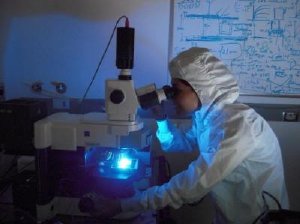Dec 7 2009
A team led by Yale University scientists has developed a way to rapidly manipulate and sort different cells in the blood using magnetizable liquids. The findings, which will be published the week of December 7 in the online edition of the Proceedings of the National Academy of Sciences, could dramatically improve the speed and sensitivity of tests used to detect cancer biomarkers, blood disorders, viruses and other diseases.
 Ayse Rezzan Kose (pictured) and Hur Koser of Yale University developed a new method for identifying and sorting diseased cells in blood samples using the magnetic nanoparticles in ferrofluids. Credit: Hur Koser/Yale University
Ayse Rezzan Kose (pictured) and Hur Koser of Yale University developed a new method for identifying and sorting diseased cells in blood samples using the magnetic nanoparticles in ferrofluids. Credit: Hur Koser/Yale University
Ferrofluids are comprised of magnetic nanoparticles suspended throughout a liquid carrier. They have been used in industrial applications for years, including in hard disk drives and loudspeakers. Now a team led by Hur Koser, associate professor at the Yale School of Engineering & Applied Science, has developed a biocompatible ferrofluid-one with the right pH level and salinity so that human cells can survive in it for several hours-and has created a device with integrated electrodes that generate a magnetic field pattern, allowing them to manipulate and separate red blood cells, sickle cells and bacteria contained in this unique solution.
The magnetic field attracts the nanoparticles in the ferrofluid, effectively pushing and shuffling the much larger, nonmagnetic cells along specific channels. Depending on the frequency of the magnetic field they apply, the researchers are also able to manipulate and sort different types of cells depending on their size, elasticity and shape.
"It's like the cells are surfing on magnetic forces," Koser said. "When we turn on the magnetic field, the nonmagnetic cells are pushed immediately up to the top of the channel." There, they roll along the surface and can be quickly directed toward a sensor.
While other cell manipulation techniques exist, this new method is unique in that it doesn't require attaching biomarkers, or labels, to the cells and there is no need for labor-intensive preparation or post-processing.
Being able to effectively sort and move cells with this technique could allow for much greater efficiency in disease detection by directing diseased cells toward sensors. Many of today's tests require hours or even days to complete, because the concentration of diseased cells in a blood sample may be so low that it takes a long time for them to randomly bump into the sensors. In early-stage cancer, for instance, there could be one tumor cell for every billion healthy cells, making them extremely difficult to detect.
"Effective and efficient separation is very important when you're looking for a needle in a haystack," said Ayse Rezzan Kose, a graduate student in the Koser Lab and the lead author of the study. "We're hoping we can achieve an increase of several orders of magnitude in the sensitivity of existing detection technologies. If so, a blood sample analysis could be completed in minutes, not hours or days."
Koser hopes that one day the new technique will lead to portable sensors that doctors can carry into the field and which could be used to test for a range of disorders, such as cancer and HIV. "Anything you can put into the ferrofluid solution is potentially detectable in this manner."
Authors of the paper include Ayse Rezzan Kose and Hur Koser (Yale University), Birgit Fischer (Deutsches Elektronen-Synchrotron) and Leidong Mao (University of Georgia).
This research was funded by the National Science Foundation, the National Institutes of Health and the Yale Institute for Nanoscience and Quantum Engineering.